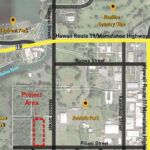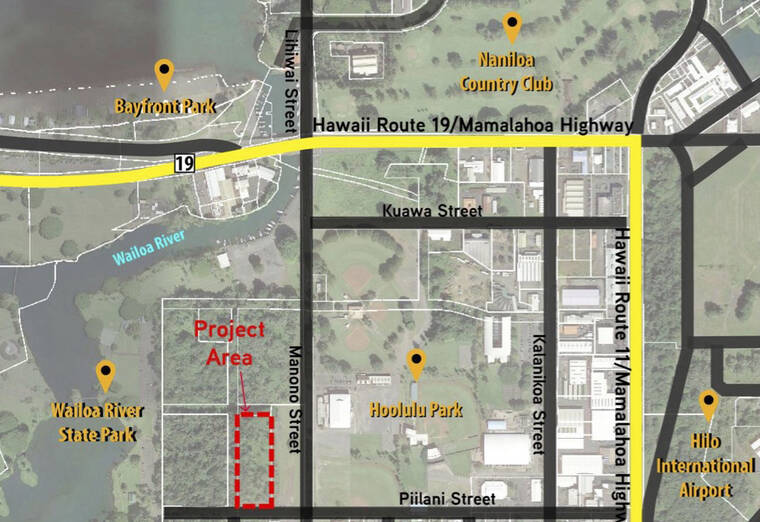One less hurdle stands in the way of a new proposal to build a water-bottling plant next to the Wailoa River State Recreation Area.
The Hawaii County Planning Department in March submitted to the state Office of Planning and Sustainable Development a draft environmental assessment for a facility that would extract and bottle water from an aquifer beneath Hilo, the second such proposal within five years. The assessment anticipates no significant environmental impact would be caused by the project.
According to the draft EA, published last week in the OPSD’s Environmental Notice, the project would develop a 2.5-acre parcel on Piilani Street in Hilo behind the Manono Mini Mart.
On the parcel would be built the “1893 Beverage and Kanaka Cafe,” which would include a 30,000-square-foot warehouse and manufacturing plant, a 1,360-square-foot cafe and a 1,000-foot-deep well tapping into an untouched freshwater aquifer beneath the site.
The project, proposed by an entity called Hawaiian Kingdom Brands LLC, would bottle and sell artesian water from the aquifer throughout the state. The proposal claims that construction is anticipated to begin this year and be completed by 2025 at a cost of $5 million.
A very similar project — albeit without the cafe — was proposed for the exact same site in 2018 by Piilani Partners LLC. That project was ultimately shot down by the Windward Planning Commission following extensive negative feedback from residents and environmental activist groups.
DuWayne Waipa, president of Hawaiian Kingdom Brands, has claimed that his organization has no affiliation with Piilani Partners.
However, details about the project mirror Piilani Partners’ proposal in several ways. According to the Hawaiian Kingdom Brands proposal, the well would extract up to 2,100 gallons per minute, with a maximum daily withdrawal of 200,000 gallons per day — the same maximum set by Piilani Partners, which in 2018 estimated the daily extraction rate could produce 1.2 million 20-ounce bottles each day.
Water studies indicate that the aquifer discharges roughly 21.1 million gallons into the sea daily.
However, one significant difference between the two proposals is the composition of the bottles. While Piilani Partners proposed to use plastic bottles — a source of significant ire among the environmentalists who testified against the plan — Hawaiian Kingdom Brands’ proposal states that the business intends to use glass bottles, although it adds that, in the event of supply shortages, recycled plastic bottles could be used for “non-local market sales.”
Although the draft EA found no environmental impacts from the project, it included several concerns raised by state and county agencies and residents.
Comments from the Department of Land and Natural Resources’ Division of Aquatic Resources noted that there is insufficient data regarding the area’s groundwater discharge or recharge rates to accurately predict how the well could impact nearby aquatic ecosystems, such as the nearby Waiakea Fishpond and Wailoa River.
And Hawaii Island Sierra Club Conservation Committee Chair Cory Harden — who testified extensively against the Piilani Partners proposal — cited many of the same concerns regarding the new proposal.
“The aquifer they propose to tap into has been identified as ‘fresh, irreplaceable and highly vulnerable to contamination’ by the state Office of Planning,” Harden wrote last August. “They would extract a natural public trust resource — water —solely for commercial gain. There is a risk of contamination, from arsenic in the muck at the bottom of nearby Wailoa River, if a tsunami hits before valves in drilling pipes can be closed. For Piilani Partners, the commission said that the tax revenue and the few jobs that would be generated did not justify the risk of contaminating public trust water.”
Harden went on to note that despite the proposed use of glass bottles, the bottling plant would create significant impacts regardless.
“Extracting, processing, bottling, transporting, and refrigerating water burns oil — nationwide, 50 million barrels a year,” Harden wrote. “If bottles contain … polyester, that doesn’t biodegrade, but breaks into tiny fragments. The fragments absorb pollutants which can contaminate water and the food chain. Bottled water has been banned by six cities, almost two dozen national parks, and over a dozen colleges and universities.”
Harden added that, despite Hawaiian Kingdom Brands’ stated connection to the Hawaiian Kingdom of old — the draft EA describes elsewhere that part of the project’s mission is “to be a visible reminder that the Hawaiian Kingdom exists” — the site itself has been purchased by an out-of-state company.
Tax records indicate that the lot was purchased in 2021 by Talon 1 Properties LLC, an Arizona-based entity, for $1 million.
The draft EA notes that the project still requires several permits and approvals from the state and county in order to go forward, most pertinently a special management area use permit from the county, which will require hearings by the Windward Planning Commission. No such hearing has yet been scheduled.
Email Michael Brestovansky at mbrestovansky@hawaiitribune-herald.com.









